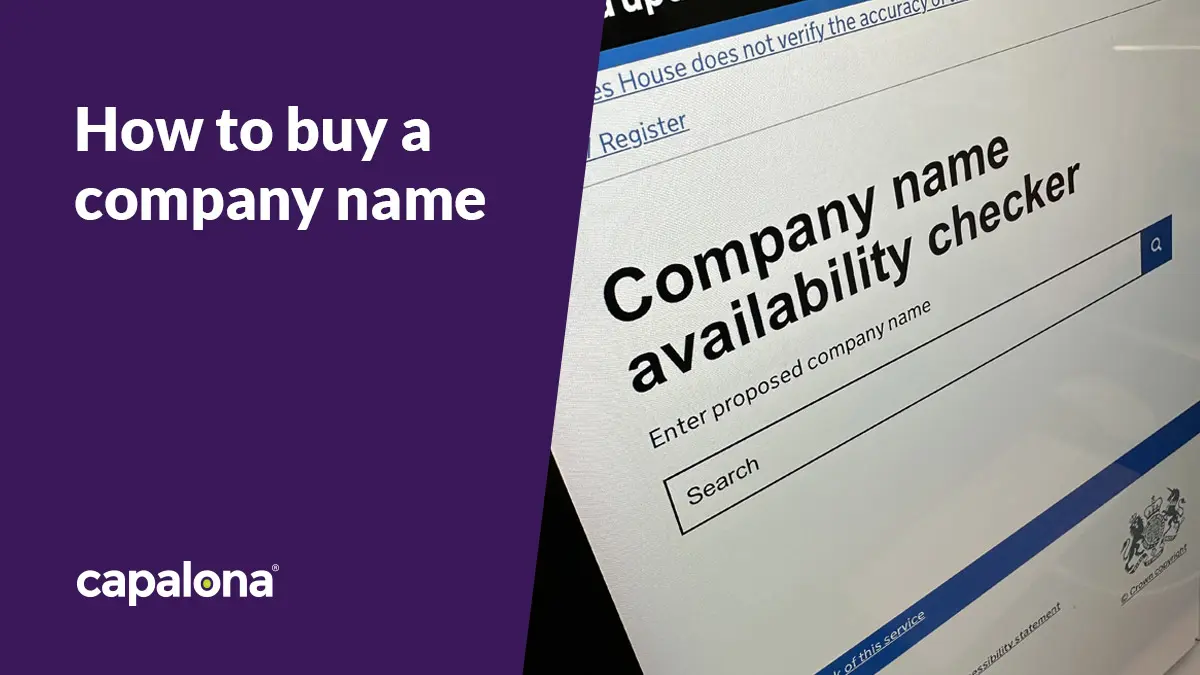You have a great idea for a business, but now what? To get it off the ground, there are a few things you’ll want to do, from choosing your business name and legal structure to creating a bank account and learning how to market your business. It can seem overwhelming, but you'll be ready to launch in no time by taking it a step at a time.
There were over five million small businesses in the UK at the beginning of 2022, so if you want to join them and start your own business but fear of failure or lack of funds holds you back, keep reading as we guide you through setting up for success.
Why start your own business?
The reasons for starting your own business are personal and individual. You might be fed up with the 9-5 grind, or maybe you’ve noticed an opportunity to turn your hobby into a profitable business — many choose the route to self-employment after being made redundant.
So, whatever your reasons for starting a business, they’re valid.
Some benefits to starting a business include:
- Complete flexibility over your work schedule
- An opportunity to earn more money
- Doing something you enjoy
- Being your own boss
Alongside these great benefits, there are some risks you should carefully consider before taking the plunge, like the financial strain of running your own business, your ability to find and market to customers, and the availability of stock, along with other business expenses like rent.

Steps to starting a business
Getting your business to the point of launch can be stressful. With so much to get in place and research, it can all quickly get overwhelming, particularly if this is your first time being self-employed.
But once you’re set up, you can focus on running your business, which can be much more straightforward and enjoyable. So, here are a few things to consider when setting up your business:
Choose the right business
To grow a successful business, you must first refine your business idea. Is your idea viable? Do others do what you do? How can you do it differently or better? Conduct preliminary market research to see what’s out there and note how they do it. Contact them directly and ask your burning questions. I.e. if they don’t share pricing on their site, get in touch and ask what they charge.
This is an essential step toward choosing the right business for you. For example, although you might love dogs and want to start a dog-walking business, do you want to pick them up from their owner’s homes or walk them from their house? There’s a vast difference between the two. For the first, you’d need a van, different business insurance, etc.
Always think about your business idea fully to understand whether it’s something you want to take on. Take a look at our viable business ideas here for more inspiration.
Decide on a company name
Your company name should be something people can both spell and easily remember. Many sole traders use their names in their company name, like ‘Marketing by Julia’. But if you’re incorporating a company, you need first to check your chosen company name is available by using the Gov.uk name availability checker. You can also check the trade mark database to register a trade mark.
When you’ve decided on a name, you can go ahead and purchase things like website domains and set up your email provider. Bear in mind that domains containing competitive keywords are more expensive.
Pick a company structure
It’s relatively easy to set up any kind of business, so whether you choose to become a sole trader or limited company is purely down to personal preference. Each has pros and cons, so take some time to understand which is more applicable to you.
Here’s a quick pros and cons list for both sole traders and limited companies:
Sole trader
Pros:
- Free and easy to set up as a sole trader
- You don’t legally need a separate business bank account
- Your finances are kept private (they’re not on Companies House)
- After paying income tax, whatever you earn is yours
Cons:
- Not all lenders will consider lending to a sole trader
- Might not be seen as professional by clients
Limited company
Pros:
- Being limited can look more professional
- It can be more tax-efficient
- You don’t have personal liability for business debts
- It costs £12 to set up a limited company
Cons:
- There are more admin responsibilities
- Most lenders will only consider applications from limited companies
Find business insurance
Which business insurance you choose will depend on the type of business you set up. For example, if you’re an e-commerce-only business, you’ll need online retailer insurance. This type of insurance usually includes both public liability and product liability insurance. Alternatively, if you’re a business consultant, you might just need professional indemnity insurance, which covers costs to fix any mistakes you make.
If you have staff, you’ll need employers’ liability insurance, and there are other insurance products like cyber insurance or equipment breakdown insurance you might want to consider, depending on the type of business.
Open a business bank account
Regardless of your legal business structure (sole trader, partnership or limited company), you should consider opening a business bank account. This keeps personal and business expenses separate, making it much easier to decipher how much tax you must pay each year.
Different bank accounts come with different perks. For example, some give cashback or a cash bonus for signing up, some have better app functionality than others, and some offer physical branches.
Create a business plan
A business plan can help you organise your thoughts and keep you on track to meet your goals. Following a business plan template can ensure you address essential aspects of your business idea you might still need to consider, i.e. financial projections.
If you seek investment in the future, investors will likely want to see your business plan to check what they’re investing in is a sound idea.

Marketing your business
The ‘build it, and they will come’ mentality is unhealthy when building a successful business. Without a robust marketing strategy, your target market won’t find you, no matter how great your business idea is.
Finding your target audience
You’ll have a rough idea of who might purchase your product or service, and that’s a great place to start understanding your audience, their motivations for buying and how you can solve any challenges they might have.
For example, if you’re starting a catering business, you can consider the types of events people need food for—weddings, funerals, birthday parties, etc. Focus on one audience to start with and dig deeper. What kind of food would a wedding party need? Build relationships with other wedding suppliers — venues, florists, and photographers. And craft a buyer persona based on the knowledge you gather.
Once you have a few customers, take time to ask them questions: how did they find you? Why did they choose you? Always build that picture of your target market to identify when behaviour patterns change and alter your strategy to meet them.
Remember, by marketing to everyone, you’re appealing to no one.
Set up your social media accounts
Different social media platforms have different audiences and purposes. For example, if you’re running a business selling goods to consumers, you might want to consider more image-based platforms like Instagram or Pinterest. If your business is attracting other companies, for example, if you’re a business consultant, you might want to consider LinkedIn.
Top tips when setting up social media:
- Focus on one platform first; your time is precious, so don’t spread yourself too thin
- Interact with your audience, comment, like and engage followers to grow a loyal base
- Post consistently
- Always continue social listening; listen to what your audience talks about online to adapt your strategy
Hone your branding and pin down your brand values
Think about the brands you follow, and ask yourself why you follow them. Do their values align with yours? How can you build a brand that aligns with what your audience cares about?
Sustainability is now even more important to modern shoppers, with 81% preferring to buy from sustainable sellers. So, consider shopper behaviours like this when mapping out your values.
Next, think about colours you want to become synonymous with your brand and stick to them. Make sure your brand is recognisable to its most loyal customers. For example, if you have too many logo variations — one on Instagram and a different one on your site- you’re not building a recognisable brand.
Choosing your brand values and colours doesn’t mean they’re locked in forever; you can change them as your business grows and evolves, so don’t put too much pressure on yourself to get it right the first time.

Raising capital for your business
If you want to grow your business quickly, you might want to raise working capital to invest in stock, renovate premises or hire staff. But what are your best options?
Ask friends and family
Borrowing money from family and friends can be the quickest way to get cash for your business startup, and it’s popular, too, with just under 40% of startup founders raising money this way. If they have the money in their bank account, it’s just a case of transferring those funds to you.
Always draw up a repayment plan so everyone knows what repayments to expect and when. Getting money from relatives and friends can be a much cheaper way to lend, with a much lower interest rate or perhaps none.
Apply for a business loan
A business loan can be a great way to get an injection of cash to grow your business. You can apply for unsecured or secured loans, so you decide whether to offer collateral or a personal guarantee. Or you can pay higher interest rates and lend lower amounts by applying for an unsecured loan. Funds can be in your account within 48 hours after loan approval.
Crowdfund or find other investment
Getting investment can be a great way to side-step monthly loan repayments. Instead, with crowdfunding, you give away something to the small investors depending on how much they invest. For example, if you’re selling products, you might send them a product once it’s been manufactured and is ready to sell. Or, if you seek investment from an angel investor, you would give them a percentage of ownership equity instead of repaying the money they lend.
Seeking investment from angel investors can rapidly grow your business, but by relinquishing some control over your business, you’re no longer the only one in the driving seat. It’s a decision you shouldn’t take lightly.
Three pieces of advice from current business owners
Learning from others’ mistakes can help you save time and money, so we spoke to three business owners who shared their top tips for budding business owners.
Keep taxes separate and invest in education
David’s a wedding photographer, working both locally in the North West of England and travelling to destination weddings. And although he’s only relatively new to the world of self-employment, he’s learnt a lot about what does and doesn’t work for his business.
"Invest in education. People pay upwards of £9,000 for university education, so don’t rule out paying to access courses from others in the industry you’re trying to break into. Learning from others more experienced than yourself is how you’ll learn quickly.
Also, never touch your tax; separate it into a different account from your personal bank account. Then, when self-assessment comes around, you’re never surprised by how much tax you owe. You don’t want to scramble to find money to pay your tax return; it’s stressful and unnecessary! Every time a customer pays me, I leave up to 40% in a separate pot; sometimes, I have a little left over, which is a bonus. Oh, and get yourself a good accountant!"
Check out David’s wedding gallery here: clarityweddingphotography.co.uk
Save enough money to cover you for a few months
Bethany is an SEO Consultant working with small and medium businesses, optimising their website content and helping them generate leads through carefully crafted search strategies. Having been self-employed for just under two years, Bethany has some great advice for newbies:
"There’s always an element of risk before starting any business, but depending on your business model, I’d recommend having enough savings to cover a basic salary for at least 3-4 months just in case money doesn’t come in straight away. It’s also useful to reach out to other entrepreneurs through existing connections or on platforms like LinkedIn. You’d be surprised how helpful many fellow business owners can be in providing advice and mentorship during these early stages."
Learn more about Bethany’s SEO services: ruddyduck.digital
Network, network and network some more
Rob is the founder of Ride and Wild, an adventure vehicle company. Having been self-employed for over five years, Rob’s experienced highs and lows when building his bespoke vehicle conversion business (highs include being featured on BBC’s Saved and Remade and The Great Interior Design Challenge!).
His advice for new business owners? Network.
“Networking is an essential part of building your business. Network with your family, friends, sports groups, parent and child groups, formal networking groups, and Facebook groups. The list goes on. Accept help from family and friends, and although it might feel like charity, they just want to play their role in helping you forge your new path. Take the help, support and, more importantly, their money; if you still feel bad, you can repay them when you make it!
“Extra tip: To keep costs down in the initial stages, look to your local councils and networking groups for any opportunities for free workshops, business support, and mentoring. Don’t be afraid to ask for help, and pace yourself.”
Check Rob’s conversions out at: rideandwild.co.uk
Before you go - Key Considerations when Starting a Business
Starting a business can be stressful, but if you go through the stages of setting up correctly, getting all your insurance and website in order, refining your target audience, and marketing consistently, you should be able to launch and run a successful small business.
Don’t rush to grow your business; get everything ready behind the scenes before you start looking for customers. It’s a hard journey, but is it worth the risk? Only you can make that decision.
If you’re looking for capital to get your business off the ground, we can help you compare UK lenders quickly and easily. Our free loan comparison tool matches your finance needs with eligible lenders, making accessing finance easy. Compare business loans.

















